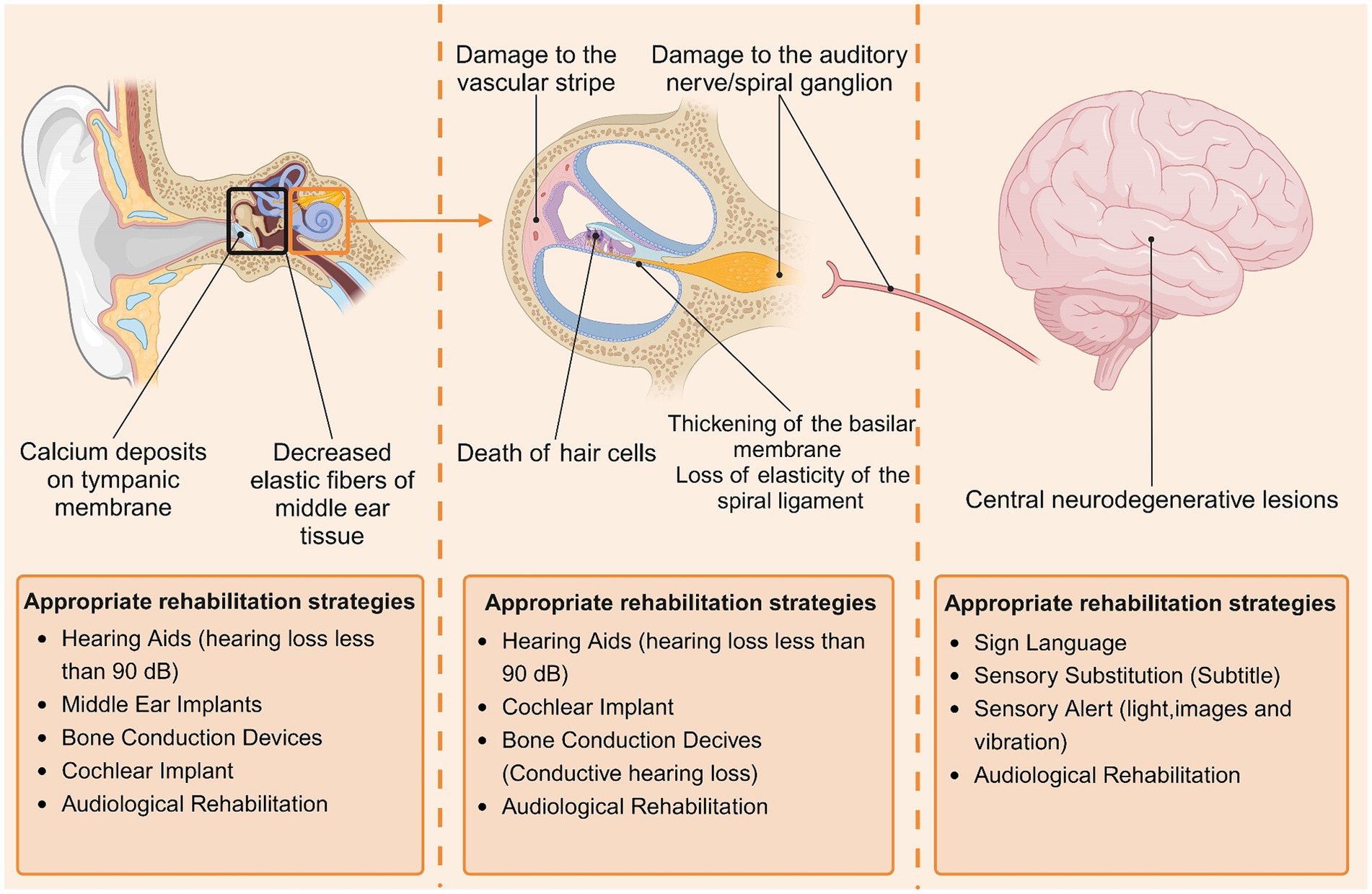Age-Related Cochlear Degeneration (ARCD)

Age-Related Cochlear Degeneration (ARCD): Overview, Mechanisms, and Clinical Implications
Age-Related Cochlear Degeneration (ARCD), commonly referred to as presbycusis or age-related hearing loss (ARHL), is a progressive sensorineural hearing impairment caused by degenerative changes in the cochlea and auditory pathways. It is one of the most prevalent chronic conditions in older adults, significantly affecting communication, quality of life, and cognitive health. Below is a detailed summary of ARCD, its mechanisms, symptoms, and management.
Pathophysiology and Mechanisms
ARCD involves structural and functional decline in the cochlea and auditory system due to aging. Key mechanisms include:
- Outer Hair Cell Degeneration:
- Loss of outer hair cells reduces cochlear amplification, leading to high-frequency hearing loss6.
- Strial Atrophy:
- Degeneration of the stria vascularis impairs ion homeostasis, reducing the endocochlear potential necessary for auditory transduction16.
- Synaptic Deafferentation:
- Mitochondrial Dysfunction:
- Accumulation of mitochondrial DNA damage from oxidative stress contributes to apoptosis of cochlear cells12.
- Chronic Inflammation:
- Low-grade inflammation in the cochlea and central auditory pathways exacerbates neurodegeneration3.
- Neuronal Degeneration:
- Loss of SGNs and central auditory neurons reduces signal transmission to the brain, impairing speech perception6.
Symptoms of ARCD
- Progressive Hearing Loss:
- Bilateral, symmetric loss starting with high frequencies and advancing to lower frequencies over time5.
- Difficulty Understanding Speech:
- Tinnitus:
- Ringing or buzzing sounds may accompany hearing loss in some individuals5.
- Cognitive Impairment Risks:
- ARCD is associated with accelerated cognitive decline, social isolation, depression, and increased risk of dementia45.
Risk Factors for ARCD
- Intrinsic Factors:
- Extrinsic Factors:
- Noise exposure, ototoxic drugs, smoking, metabolic conditions (e.g., diabetes), and cardiovascular diseases like atherosclerosis124.
Diagnosis of ARCD
- Audiometry Testing:
- Pure-tone audiograms reveal high-frequency hearing loss progressing to multiple frequencies at later stages5.
- Auditory Brainstem Response (ABR):
- Measures neural function to assess the degree of auditory pathway degeneration3.
- Imaging Studies:
Management and Treatment Options
Since ARCD is irreversible, treatment focuses on mitigating symptoms and improving quality of life:
- Hearing Aids:
- Cochlear Implants:
- Lifestyle Modifications:
- Reducing noise exposure, managing comorbidities (e.g., hypertension), and improving room acoustics can slow progression5.
- Emerging Therapies:
- Research into antioxidants (to reduce oxidative stress) and anti-inflammatory agents shows promise but is still experimental36.
Prevention Strategies
- Protect ears from excessive noise using earplugs or noise-canceling devices.
- Avoid ototoxic medications when possible.
- Maintain cardiovascular health through diet, exercise, and smoking cessation.
- Regular hearing check-ups for early detection.
Conclusion
Age-Related Cochlear Degeneration is a multifactorial condition driven by cellular degeneration in the cochlea and auditory pathways. While it cannot be reversed, early diagnosis and interventions like hearing aids or cochlear implants can significantly improve quality of life. Ongoing research into its mechanisms may lead to novel therapies aimed at prevention or slowing progression.
Consult with Our Team of Experts Now!
At DrStemCellsThailand (DRSCT)‘s Anti-Aging and Regenerative Medicine Center of Thailand, we emphasize comprehensive evaluations and personalized treatment plans of Cellular Therapy and Stem Cells for managing various health conditions. If you have questions about Age-Related Cochlear Degeneration (ARCD) or would like more information on our services, consult with our experts today!
Consult with Our Team of Experts Now!
References:
- Title: Age-Related Cochlear Degeneration and Oxidative Stress: Mechanisms and Therapeutic Targets
DOI: 10.3389/fnins.2023.1253574
Summary: Explores the role of oxidative stress, mitochondrial dysfunction, and chronic inflammation in age-related cochlear degeneration, highlighting potential therapeutic strategies. - Title: Presbycusis: An Update on Cochlear Mechanisms and Therapies
DOI: 10.1111/acel.13973
Summary: Discusses molecular mechanisms such as DNA methylation and connexin degradation in presbycusis, providing insights into emerging therapies for age-related hearing loss. - Title: Pathology and Mechanisms of Cochlear Aging
DOI: 10.1016/j.heares.2019.05.007
Summary: Reviews cellular and molecular changes in the cochlea associated with aging, including sensory cell loss and strial atrophy, with implications for understanding presbycusis.















